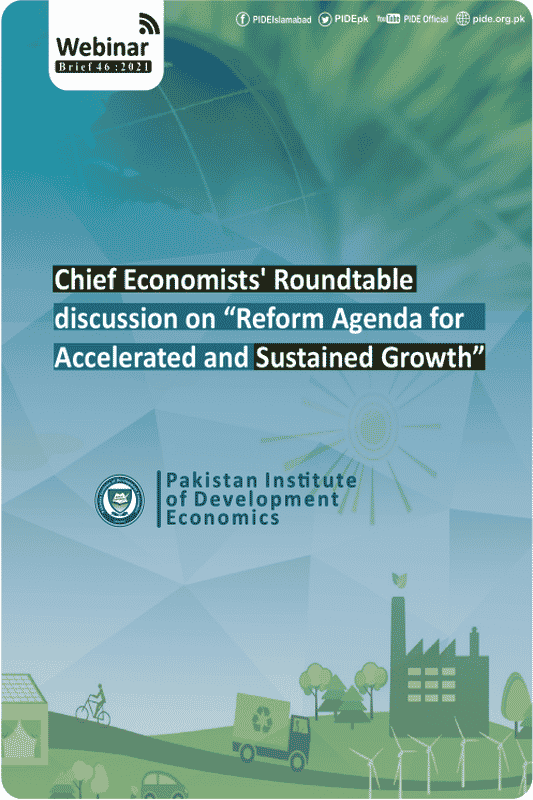
Pakistan Institute of Development Economics
- Home
Our Portals
MenuMenuMenuMenuMenuMenuMenu - ResearchMenuMenuMenuMenuMenuMenuMenu
- Discourse
- The PDR
- Our Researchers
- Academics
- Degree Verification
- Thesis Portal
- Our Portals
Chief Economists’ Roundtable discussion on “Reform Agenda for Accelerated and Sustained Growth”
Publication Year : 2021
Author: Farah Naz
Explore More : Webinars Brief
Chief Economists’ Roundtable discussion on “Reform Agenda for Accelerated and Sustained Growth”
Preamble
Vice-chancellor PIDE Dr. Nadeem ul Haque opens the forum by mentioning how important this discussion on the reform agenda would be. Seven chief economists each from federal, four provinces, Gilgit Baltistan and AJK are invited for the roundtable discussion. The discussion forum is set in collaboration with PIDE with GRASP and RASTA. Key questions to address in the discussion include
- Why long-run growth and investment are low?
- Why every time we need to go to IMF and how we can get rid of it?
- How to achieve debt sustainability?
- How to achieve a growth rate of 7-9% to accommodate the labor force entering the market?
- What should our growth strategy be?
Key points
- For a long, the focus was on the “Brick and Mortar model of growth” that needs to be shifted towards the development of “software for growth” because there are several concerns that make the former model unreliable and unsustainable.
- A paradigm shift is required from the Haq/HAG model to endogenous growth and software-based models. For which the federal government needs to develop its policy-making capacity and local government should focus on service delivery, furthermore, there is a need to bring reforms in civil services, judiciary, and regulatory bodies.
- There is a need to essentially build these four markets in Pakistan that include agriculture, energy, real estate, and cities, alongside we need to work on cross-cutting areas like openness (we have huge tariff walls instead), internet access (internet should be a human right so ought to be provided to all) and taxation (tax system needs serious reforms).
- We need to prepare for the future by focusing on research and policy attention in the areas of artificial intelligence, information management, and data processing; automation, 3D printing and robotics; agricultural technologies and food substitutes; climate change and adaptation technologies; jobs, opportunities; the value of knowledge research and e-economy, etc.
- Federal chief economist invokes the spirit of cooperative federalism and tried to set an affirmative discussion. Cooperative federalism requires clear constitutional recognition or delineation of socio-economic policies and roles & responsibilities under three major categories; federal competence, provincial competence, and mutually cooperative competence.
- The size of PSDP in Baluchistan has increased from Rs. 15 Billion (before the 18th amendment) to over Rs100 billion but the impact of this increase is not visible in socio-economic indicators which is quite disturbing. The analysis resulted in similar findings as per the PIDE report i.e. the entire focus in Baluchistan is on hardware and almost no focus on software.
- The idea of building and promoting inclusive cities is seriously endorsed in Baluchistan along with spatially targeted public investment to create growth nodes and to reduce pressure on one urban center.
- Peace, conflict resolution, political reconciliation, equity, and formalization of the informal economy have exclusive significance for growth, so these also should be part of the reform agenda.
- 70% of the ADP goes to the brick-and-mortar model in KPK. The importance of brick and mortar cannot be overlooked as it contributes significantly to economic development by creating direct and indirect jobs, forward and backward linkages which create an impact on the economic activity especially when the demand for schools, roads, and other infrastructure is rapidly increasing along with the growth of population. The existing infrastructure is very negligible when we compare it with other middle east countries. But it doesn’t mean that investment in IT and capacity building is not important, the software is also important along with the brick and mortar.
- It was suggested that a product focus regulatory mechanism needs to be created instead of a ministry or department-based approach.
- It was proposed in a forum that there is a need for Pakistan to present itself as a single regulatory market to attract domestic and foreign businesses which could be possible through a national regulatory agency that may comprise federal and provincial governments for the sake of harmonization of laws and regulations.
© 2024 Pakistan Institute of Development Economics



